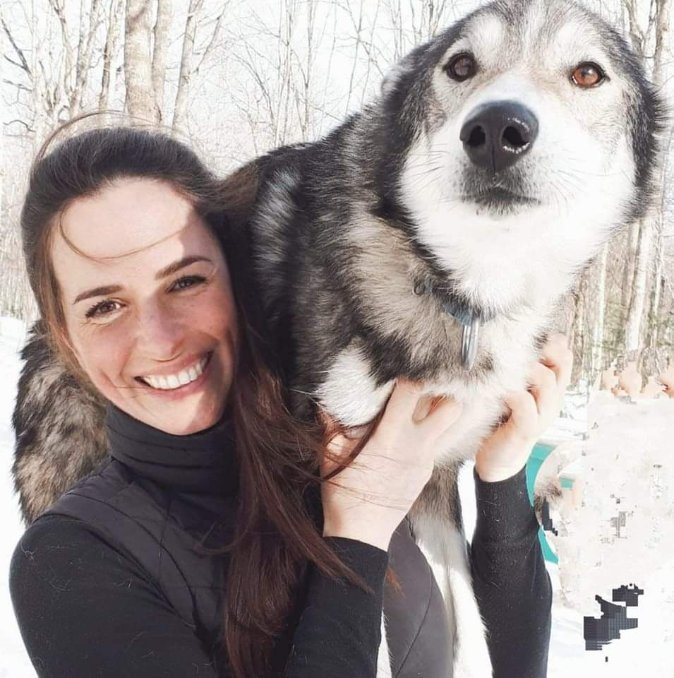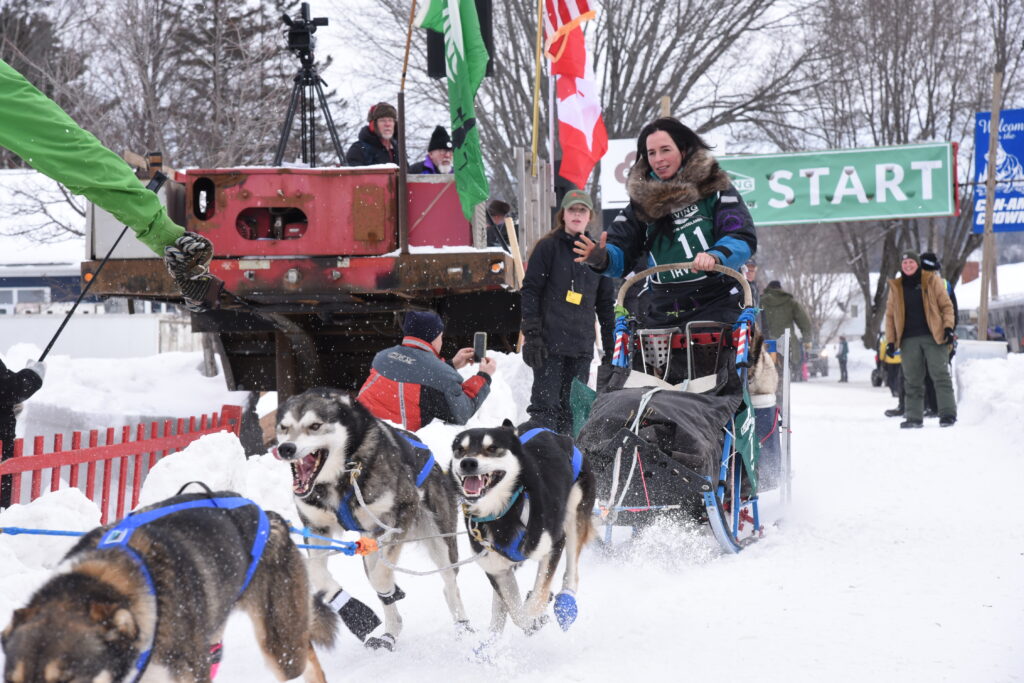
FORT KENT, Maine — New regulations for traveling across the border with dogs may threaten the future of Fort Kent’s Can-Am and other sled dog races throughout North America, says the Canadian woman who won the last northern Maine race.
Katherine Langlais of Glenwood, New Brunswick, who won the Can-Am event in 2023, has been speaking out about how these regulations could create a logistical nightmare that results in lower turnouts in mushing events throughout North America.
The U.S. Centers for Disease Control and Prevention rules, which go into effect on Aug. 1, would require dogs to be at least 6 months old and to appear healthy in order to enter the U.S. Any dog under 6 months old would be denied entry. They would also need to have International Standards Organization compatible microchips and a new rabies vaccination.
Anyone traveling with their dogs from Canada would need to get a signature from a Canadian Food Inspection Agency veterinarian indicating that the dog is arriving from a low-risk or rabies free country.
Mushers will be prohibited from participating in international events because of the additional time and money that these rules require, Langlais said. That could be devastating for towns such as Fort Kent, for which events like the Can-Am provide a major economic boost.
“And if there’s less mushers, there’s going to be less races that can continue,” she said. “Because if there are less mushers, there are less sponsors.”

Langlais has been mushing with her partner Remy Leduc for over a decade.
“We started to run races across North America in 2011,” she said. “We’ve been growing ever since, and our desire to run larger races has been growing ever since,” she said.
Langlais made Can-Am history in 2023 when she became the first woman to win the 250-mile race. Florence Shaw and Diane Marquis, both of Quebec city, respectively won the 100-mile and 30-mile races.
Langlais says these new regulations could affect the ability of mushers to travel across the border due to prohibitive expenses and time-consuming veterinarian visits. She said she is not against vaccinations, but she is speaking out against these rules due to their potentially damaging effect on future races, tourism, and the strain they will place on veterinarians.
On July 17, Canadian Minister of Health Mark Holland issued a statement saying that he and Members of Parliament have concerns with these new regulations. He said the Canadian Food Inspection Agency has been working with the CDC to find a better alternative to these rules.
“These new CDC regulations will impact all dogs entering the U.S. from Canada and will require Canadians to take on additional planning costs to satisfy the new requirements,” Holland said in the statement.
Holland added that these regulations could affect tourism in both the U.S. and Canada, limit travel for people with service dogs, and place a strain on transportation sectors such as trucking as well as the local economies in border communities.
These rules would affect anyone who has just one dog. But for someone like Langlais, who owns between 35 and 40 dogs and travels internationally with upwards of 27 dogs, they can be devastating.
For mushers like Lea Allen, who lives in New Brunswick but works at the University of Maine at Presque Isle, the new regulations will prevent her from participating in the next Can-Am event.
She said the vaccine record form on the CDC website is not consistent.
“In one place on the website, it says that if you get that form filled out with your rabies vaccine information, you can use the same form for multiple entries,” Allen said. “But on another part of the website it says that you can only use it for one entry.”
Allen said her veterinarian told her that offices are overworked just doing regular care and do not have time to handle any additional paperwork.
“Even if that form is good for multiple entries, I might not make it, at least for this year’s race,” Allen said. “She can’t even fit me in for regular vaccines, let alone to revaccinate dogs that are already good for three years with the rabies vaccine.”
Langlais is hopeful that, after Holland’s announcement on July 17, a cheaper iteration of the rules can be reached. As originally proposed, the CDC’s changes would cost an extra $5,000 to travel across the border with her dogs.
“It’s hard for me, because I want our sport to thrive,” she said. “It’s not going to stop me from wanting to run races across North America. That’s for sure.”
Langlais usually runs two teams of dogs, with one team of inexperienced dogs under 2 years old. But now, she will likely just travel with the one main team.
“I definitely don’t want to arrive in Michigan or Alaska and be turned around because my paperwork isn’t accurate,” she said. “Do I want to continue traveling with as many dogs as before? I’m not sure, but it’s not going to stop us.”
Fort Kent Town Manager Suzie Paradis said in a Wednesday press release from Congressman Jared Golden that these regulations could hurt the community. Golden asked the CDC to delay implementing the rule until a more workable alternative can be found.
“The prohibitive costs and complexities of these requirements could discourage families and competitors, impacting not only our local economy but also the vibrant community spirit that these events and pet ownership foster,” Paradis said.
In addition to Golden, 14 U.S. Senators have also asked the CDC to reconsider these rules, with many pointing out major differences between the final rule and what they originally proposed.
David Daigle, associate director for communication in the CDC’s Office of Public Health, said that the CDC is aware of the feedback and that its primary goal is to protect the U.S. population from diseases like rabies and to prevent fraudulent dog imports.
“CDC is aware of the concerns associated with the recently published updates to the dog importation rule,” he said. “We value the feedback received from various countries, industry partners, and the public, and are actively working with federal and international partners to discuss the feedback received.”
If these rules are not changed, Langlais said it will likely result in fewer sled dog races across North America.
“It’s all of these things that make me want to continue fighting for our sled dogs, which, to me, is a part of our culture and of our North American heritage,” Langlais said.







